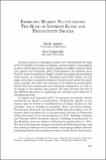Artículo
Emerging market fluctuations: the role of interest rates and productivity shocks
Date
2008Abstract
Business cycles in emerging markets are characterized by high levels of volatility in income, investment, and net exports. Consumption is more volatile than income, and net exports are highly countercyclical (see Aguiar and Gopinath, 2007). Furthermore, the interest rates faced by these economies are highly volatile and negatively correlated with income, as described in Neumeyer and Perri (2005). In this paper, we adopt a standard stochastic business cycle model of a small open economy and allow the economy to be driven by productivity shocks that have permanent and transitory components, as well as by shocks to the interest rate process. We then estimate the role of the different processes in explaining the business cycle behavior of emerging markets.
Collections
View/


